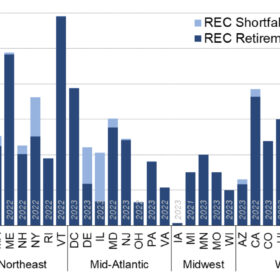A bipartisan group of U.S. lawmakers introduced the American Tax Dollars for American Solar Manufacturing Act, aiming to prevent Chinese solar module manufacturers from claiming subsidies for their American factories.
The Inflation Reduction Act, passed in 2022, offers manufacturing 45 X tax credits for solar components made in America. While the lucrative tax credits have been attracting clean energy manufacturers worldwide to build factories in the U.S., the fact that some of the new manufacturing facilities are from Chinese companies has created a controversy that this new bill aims to solve.
The bill was introduced by Senators Sherrod Brown (D-Ohio), Bill Cassidy (D-LA), Jon Ossoff (D-GA) and Rick Scott (D-FL), seeks to protect U.S. solar manufacturing by removing the tax incentives for Chinese companies and from other “foreign entities of interest” would not be able to receive the 45X tax credits.
“By reshoring the solar supply chain, we can bolster solar manufacturing in the U.S. and ensure our country is not dependent on China for a technology that was invented here and accounted for half of our new grid energy additions last year, said Mike Carr, Executive Director of the Solar Energy Manufacturers for America (SEMA) Coalition.
The Defend Solar USA Alliance also supports the new legislation. The Alliance said in a release that while the 45X tax credit has contributed to the largest investments in factory production in nearly 100 years, it’s estimated that Chinese-controlled companies could collect more than $100 billion in federal tax credits. These credits, the Alliance contends, were “designed to support U.S. clean-energy manufacturers”.
“We shouldn’t be in the business of rewarding China at the expense of our domestic solar industry,” said U.S. Army General John Adams (ret.), and Board Member of the Defend Solar USA Alliance. “The bipartisan bill would ensure that Americans’ taxpayer dollars stay right here at home rather than help subsidize a foreign government’s efforts to put domestic manufacturers out of work. By building a successful domestic solar industry, the U.S. can break from its reliance on foreign energy sources, strengthen our supply chain and reduce our vulnerability to geopolitical conflicts.”
This content is protected by copyright and may not be reused. If you want to cooperate with us and would like to reuse some of our content, please contact: editors@pv-magazine.com.









By submitting this form you agree to pv magazine using your data for the purposes of publishing your comment.
Your personal data will only be disclosed or otherwise transmitted to third parties for the purposes of spam filtering or if this is necessary for technical maintenance of the website. Any other transfer to third parties will not take place unless this is justified on the basis of applicable data protection regulations or if pv magazine is legally obliged to do so.
You may revoke this consent at any time with effect for the future, in which case your personal data will be deleted immediately. Otherwise, your data will be deleted if pv magazine has processed your request or the purpose of data storage is fulfilled.
Further information on data privacy can be found in our Data Protection Policy.